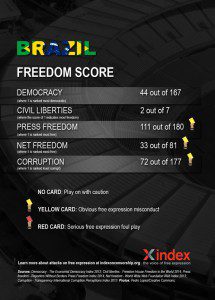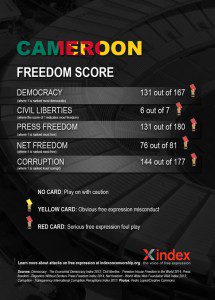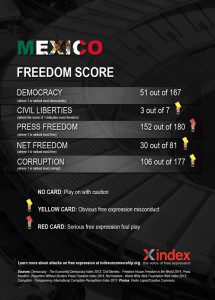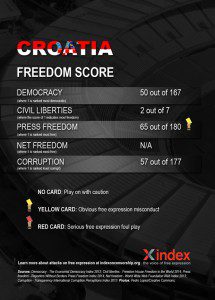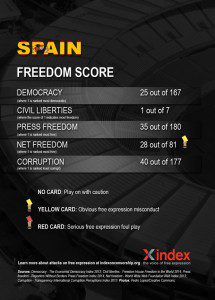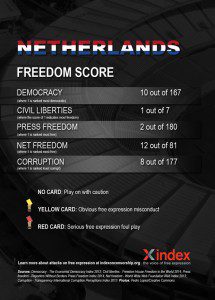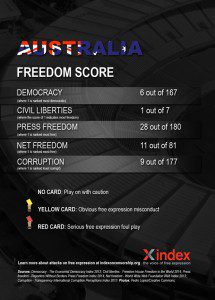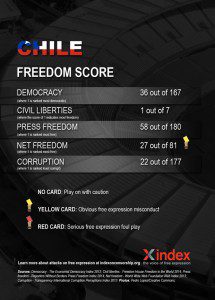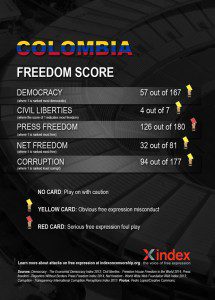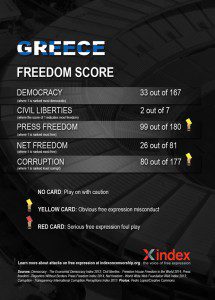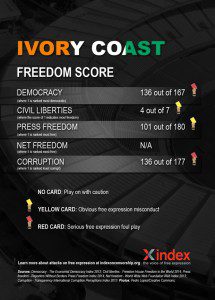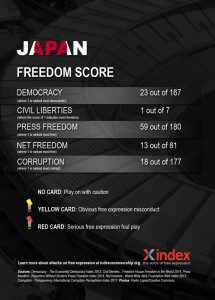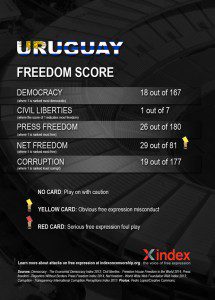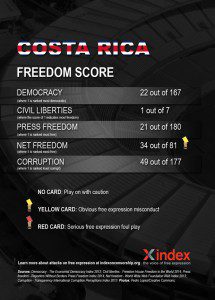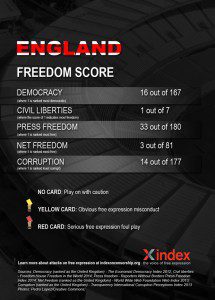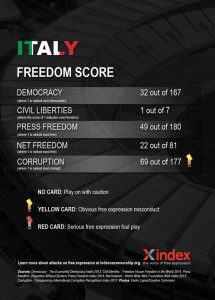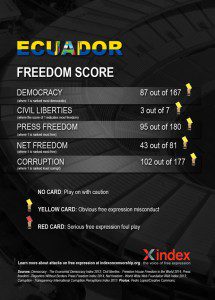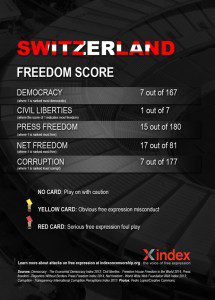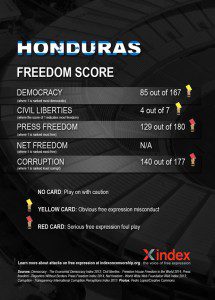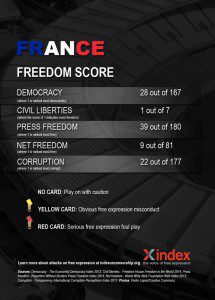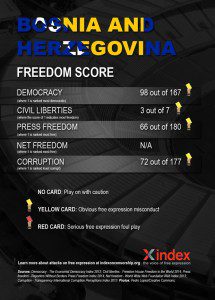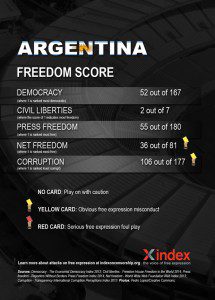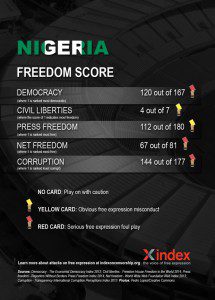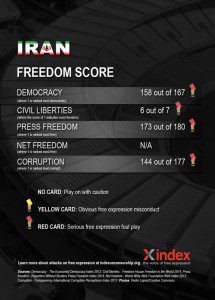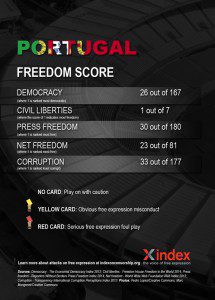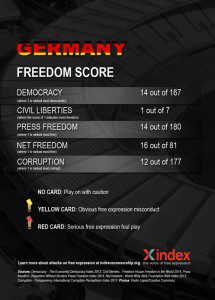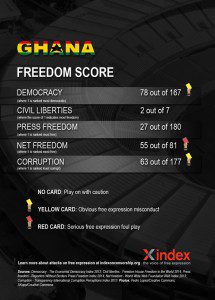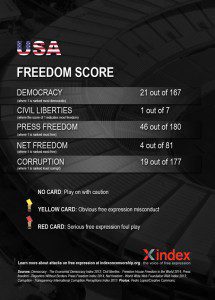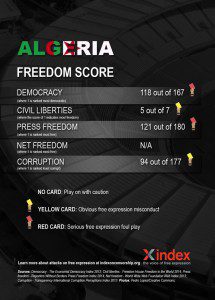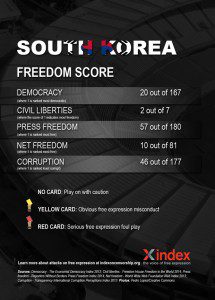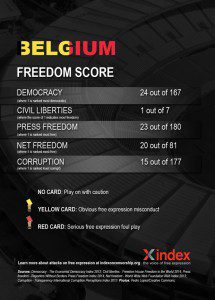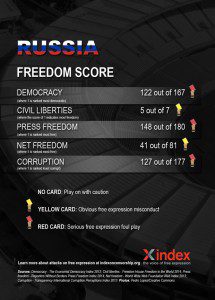1 Jul 2014 | India, News and features
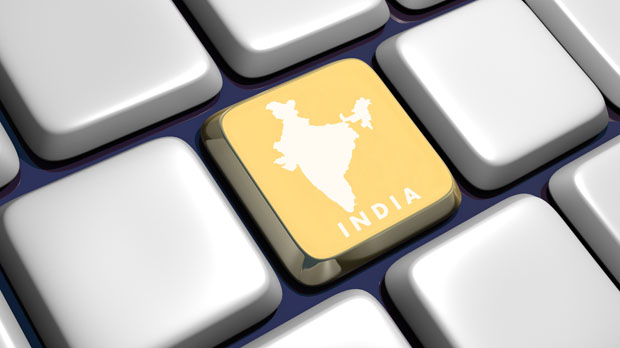
(Image: Shutterstock)
A month has passed since Narendra Modi became prime minister of India, and brought the right wing Hindu nationalist BJP (Bharatiya Janta Party) back into power. Much has been written about his government, with observers either hailing him as an economic messiah who will fix India’s dwindling economy or a divisive politician who has built his career on the back of communalism.
Those watching freedoms, especially of free speech and the media, are among the people apprehensive about life under Modi’s government. While the prime minister himself has blogged about the importance of free expression, recent arrests, including of citizens directly critical of him, paint a worrying picture. Additionally, the rise of “communal posts” on social media, real or planed, have lead to violence on the ground, and a debate about how best to police social media and free speech online.
In June, a young Muslim IT graduate lost his life to an angry mob in the city of Pune, Maharashtra, due to violence that erupted after morphed pictures of a historical figure appeared on Facebook and WhatsApp. The pictures were said to be triggers for crowds to damage shops and public transport, ultimately resulting in communal violence and the loss of an innocent life. However, reports from the Anti Terror Squad of the Maharashtra police indicate that the outbreak of violence following the uploaded picture does not seem sporadic or unplanned.
The state government has issued familiar warnings about the misuse of social media by groups that are looking to incite communal tension. Home Minister, R. R. Patil, was quoted as saying that “anti-social elements are posting inflammatory posts to stoke hatred, bitterness and disharmony between sects”, warning that such posts could result in action not just against those who post the photos, but also those who “like” them. Of course, this was the same state which saw two girls were arrested last year for allegedly sparking communal violence — one for writing a Facebook update, and the other girl simply for “liking” it. Therefore, any action by the government needs to be tempered by what the fallout could be for ordinary citizens and their right to free speech.
But authorities are not alone in seeking a solution to the problem of potentially inflammatory social media postings — civil society groups are also trying novel ideas to counter the trend. Ravi Ghate, a social entrepreneur and founder of a community SMS newsletter in Maharashtra, has banded together with like-minded folks to form a group on Facebook called “Social Peace Force”. Amassing over 18,000 members in ten days, the mission of the group is to “stop anti-social messages on Facebook” by reporting them as spam. “It’s the easiest and technological way to fight the culprits who are spreading anti-national messages/images and stopping ourselves from development!” is the logic the group adheres to. Many of the new members have posted comments indicating their genuine desire to help stop the spread of abusive and communal messages. Therefore, once identified, all members of the group will report a message or posting to Facebook thereby pressurising them to remove the post before it can do any more damage. The group has also instituted a panel of experts who are meant to examine any troubling post and give the go-ahead for the group to act.
What has spurred this move? “How many times can you go to court,” Ghate told Index. “It is too expensive. And the problem is that by the time the police takes down the content, the riot has already taken place.” For them, “suppressing content at the source” in a timely manner is key. A technological solution within the boundaries of Facebook’s own rules of engagement seems to some a far more pragmatic solution than going to the courts again and again.
Seen from a broader lens however, the group’s solution seems to be to shift the onus from the courts to decide the parameters of free expression and “objectionable” content, to big, profit-making, multinational corporates. What might seem today a no-brainer because of some obviously mischievous content, could in time, pose an interesting dilemma: Should social media giants control the boundaries of (social media based) speech in countries such as India, based on their own internal policies, and not the laws of the land? And all this, because of a push by the citizens themselves, to bypass courts and go directly to the corporates.
It is ironic that “Big Brother’ – which is what some newspaper headlines called the group – when translated into Hindi could be interpreted as “elder brother”, indicating a protective instinct, which certainly seems to be the case here. The current mandate of the group is only to focus on religious content to keep “social harmony”. That in itself is not a straightforward task; just ask Wendy Doniger, author of ‘The Hindus: An Alternative History’. However, this and the many spinoff groups they will inspire could morph into something they did not intend. Legitimate art, literature, satire and other forms of expression could become victims of the mob. Then there is danger of more organised groups and political parties taking to social media directly to suppress content — especially political critique — on a regular basis. And finally, those who wish to subvert social media platforms to have an excuse to incite violence on the street, will certainly find more creative ways to do so.
There is of course, the other side of the coin. Will Facebook remove content that has been pre-determined to be objectionable when faced with a large number of people reporting it? The simple answer is, we don’t know. Facebook has its own community standards, and these cover a broad range of topics, including the following: “Facebook does not permit hate speech, but distinguishes between serious and humorous speech. While we encourage you to challenge ideas, institutions, events, and practices, we do not permit individuals or groups to attack others based on their race, ethnicity, national origin, religion, sex, gender, sexual orientation, disability or medical condition.”
And a recent experiment by an Indian think-tank revealed that Facebook did not necessarily remove content flagged as objectionable by users, solely on the basis of it being flagged. As Facebook told them: “We reviewed the post you reported for harassment and found it doesn’t violate our Community Standards.” It is quite possible that the newly formed Social Peace Force will feel let down by Facebook as well, if content is not removed immediately. What happens then?
However, this latest development harks back to the problems with India’s current legal mechanisms. India’s IT Act has become infamous for a certain Section 66(A) which can be used to arrest people for information used for the purposes of “annoyance, inconvenience, danger, obstruction, insult, injury, criminal intimidation, enmity, hatred or ill will”. Public outrage at wrongful arrests led to the courts passing an order that no person would be arrested without “prior approval from an officer not below the rank of inspector general of police”. At the same time, the establishment is not above slapping graver charges (such as inciting communal violence) under other sections of Indian law — including the Indian Penal Code — for fairly innocuous activity. This has lead to some amount of distrust at the government’s own commitment to freedom of expression.
Of course, citizens have a right to appeal to social media platforms if they take offense to any content posted there. The point remains, however, that maintaining communal harmony and law and order is a tricky and layered problem. The role of the state, and the loss of confidence citizens have in it, must be addressed as well. Earlier solutions have included the state governments of Jammu and Kashmir preempting violence by switching off social media and YouTube for a few days, in the wake of burgeoning riots around the world because of the video “The Innocence of Muslims”. At another time, the government of India restricted text messages to five a day to curtail vicious rumours targeting a minority community settled in south India. India’s National Integration Council met in September 2013 after social media posts had been blamed for causing riots in Uttar Pradesh, and many states are setting up social media monitoring departments to raise “red flags”, much like the Social Peace Force itself.
A coherent and honest study of the abuse of social media platforms by fringe groups to incite violence should take place. Given the fast paced nature of the medium, the question for a country as prone to communal riots as India is: how can one control them? Is counter-speech to drown out hate speech a strategy to be employed? Is clamping down on free speech effectively going to reduce religious intolerance? Does bypassing legal routes and going straight to the “source” help? A national dialogue on the matter might be more fruitful in the long run than the flowering of surveillance groups cutting across the board — be they citizen or state-led.
This article was published on June 30, 2014 at indexoncensorship.org
17 Jun 2014 | Volume 43.02 Summer 2014
[vc_row][vc_column][vc_custom_heading text=”In the summer issue of Index on Censorship magazine, we include a special report: Brick by brick, freedom 25 years after the fall of the Berlin Wall.”][vc_row_inner][vc_column_inner width=”1/2″][vc_column_text]
As Europe prepares for the anniversary of the wall’s demolition in November, Index on Censorship looks at how the continent has changed. Author Irena Maryniak explores the idea of a new divide that has formed further east. Polish journalist Konstanty Gebert looks at how Poland’s media came out from the underground and lost its voice.
[/vc_column_text][/vc_column_inner][vc_column_inner width=”1/2″][vc_single_image image=”58030″ img_size=”full”][/vc_column_inner][/vc_row_inner][vc_column_text]
Award-winning German writer Regula Venske shows how Germany has tackled its identity issues through crime fiction; and Helen Womack reports from Moscow on the fears of a new Cold War. We also give voice to “Generation Wall” – the young people who have grown up in a free eastern Europe.
When the wall came down in 1989, there were discussions in the Index office about whether our battles were over. Sadly, we all know there was no universal end to censorship on that day. This issue also shares stories of the continuing fight for free expression worldwide, from a scheme to fund investigative journalism in Tanzania to an ambitious crowdsourcing project in Syria.
Also in this issue:
• Dame Janet Suzman looks at censorship of South African theatre on the 20th anniversary of South African democracy
• Jim Al-Khalili shares his thoughts on threats to science research and debate
• Ex BBC World Service boss Richard Sambrook goes head-to-head with Bruno Torturra, from Brazil’s Mídia Ninja, to debate the future of big media
Plus:
• Two new short stories – exclusive to Index – from Costa first novel winner Christie Watson and Turkish novelist Kaya Genç
[/vc_column_text][/vc_column][/vc_row][vc_row][vc_column][vc_custom_heading text=”SPECIAL REPORT: BRICK BY BRICK” css=”.vc_custom_1483610192923{margin-right: 0px !important;margin-left: 0px !important;border-bottom-width: 1px !important;padding-top: 15px !important;padding-bottom: 15px !important;border-bottom-color: #455560 !important;border-bottom-style: solid !important;}”][vc_column_text]
Freedom 25 years after the fall
[/vc_column_text][/vc_column][/vc_row][vc_row][vc_column][vc_custom_heading text=”IN FOCUS” css=”.vc_custom_1481731813613{margin-right: 0px !important;margin-left: 0px !important;border-bottom-width: 1px !important;padding-top: 15px !important;padding-bottom: 15px !important;border-bottom-color: #455560 !important;border-bottom-style: solid !important;}”][vc_column_text]
[/vc_column_text][/vc_column][/vc_row][vc_row][vc_column][vc_custom_heading text=”CULTURE” css=”.vc_custom_1481731777861{margin-right: 0px !important;margin-left: 0px !important;border-bottom-width: 1px !important;padding-top: 15px !important;padding-bottom: 15px !important;border-bottom-color: #455560 !important;border-bottom-style: solid !important;}”][vc_column_text]
[/vc_column_text][/vc_column][/vc_row][vc_row][vc_column][vc_custom_heading text=”COLUMNS” css=”.vc_custom_1481732124093{margin-right: 0px !important;margin-left: 0px !important;border-bottom-width: 1px !important;padding-top: 15px !important;padding-bottom: 15px !important;border-bottom-color: #455560 !important;border-bottom-style: solid !important;}”][vc_column_text]
[/vc_column_text][/vc_column][/vc_row][vc_row][vc_column][vc_custom_heading text=”END NOTE” css=”.vc_custom_1481880278935{margin-right: 0px !important;margin-left: 0px !important;border-bottom-width: 1px !important;padding-top: 15px !important;padding-bottom: 15px !important;border-bottom-color: #455560 !important;border-bottom-style: solid !important;}”][vc_column_text]
[/vc_column_text][/vc_column][/vc_row][vc_row][vc_column][vc_custom_heading text=”SUBSCRIBE” css=”.vc_custom_1481736449684{margin-right: 0px !important;margin-left: 0px !important;border-bottom-width: 1px !important;padding-bottom: 15px !important;border-bottom-color: #455560 !important;border-bottom-style: solid !important;}”][vc_column_text]Index on Censorship magazine was started in 1972 and remains the only global magazine dedicated to free expression. Past contributors include Samuel Beckett, Gabriel García Marquéz, Nadine Gordimer, Arthur Miller, Salman Rushdie, Margaret Atwood, and many more.[/vc_column_text][vc_row_inner][vc_column_inner width=”1/2″][vc_single_image image=”76572″ img_size=”full”][/vc_column_inner][vc_column_inner width=”1/2″][vc_column_text]In print or online. Order a print edition here or take out a digital subscription via Exact Editions.
Copies are also available at the BFI, the Serpentine Gallery, MagCulture, (London), News from Nowhere (Liverpool), Home (Manchester), Calton Books (Glasgow) and on Amazon. Each magazine sale helps Index on Censorship continue its fight for free expression worldwide.
 SUBSCRIBE NOW[/vc_column_text][/vc_column_inner][/vc_row_inner][/vc_column][/vc_row]
SUBSCRIBE NOW[/vc_column_text][/vc_column_inner][/vc_row_inner][/vc_column][/vc_row]
12 Jun 2014 | Cameroon, Iran, News and features, Nigeria, Russia
The 2014 World Cup in Brazil starts today, 32 nations preparing to battle it out across eight groups in the first stage of the tournament.
This year’s competition, like so many before it, comes with its designated group of death. For those not familiar with the lingo, it means the group containing the highest amount of strong teams. Or even more simply put, the group most difficult to progress from. (You can’t accuse the beautiful game of holding back on the melodrama).
Index has looked at the countries taking part in arguably the biggest show on earth, and put together our own group of death — the freedom of expression edition.
Cameroon
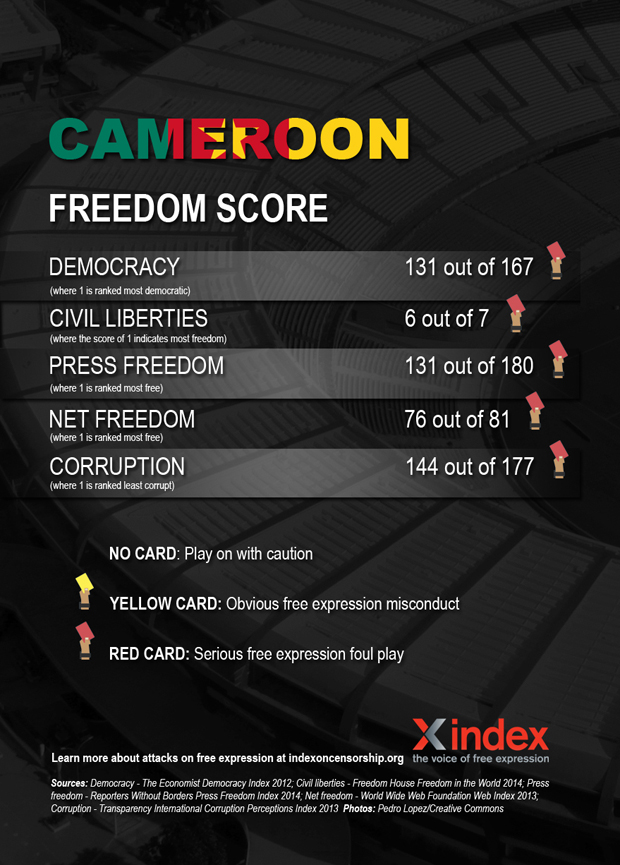
Cameroon — or the Indomitable Lions — have a solid track record in qualifying for the World Cup, having taken part seven time, more than any other African side. There were also the first African team to make it to the quarter final and are responsible for one of the most iconic moments in the tournament’s history. Their track record on free speech, however, is less impressive.
Freedom of expression is guaranteed in Cameroon’s constitution. Despite this, the government of Paul Biya — the country’s leader since 1982 — has been been accused numerous violations of free expression.
Large parts of the press are biased towards the ruling elite, while critical journalists face detainment, harassment and demands to reveal sources, among other things. Self censorship is widespread. In September 2013, 11 press outlets, including newspapers, radio stations and a TV station, were shut down for disrespecting “ethics and professional norms”. In 2010, former newspaper editor Germain Ngota, who had been investigating corruption allegations involving the state-run oil company, died in jail.
Freedom of assembly is often cracked down on. In 2012, former opposition presidential candidate Vincent-Sosthène Fouda and others were charged with “holding an unlawful demonstration”. The same year, security forces used tear against a crowd gathered to protest against Biya. In 2008, around 100 people were killed in clashes with police in anti-government riots.
Arts are not spared either. In 2013, Jean-Pierre Bekolo’s film Le President was banned in Cameroon because it discussed the end of Biya’s reign . In 2008, Lapiro de Mbanga, who criticised the constitutional change in term times that would allow Biya to stay in powers through song, was arrested.
Homosexuality is outlawed, and punishable by up to 14 years in prison. Human rights violations against LGBTI people, or those perceived to be, are “commonplace”. In July 2013, Eric Ohena Lembembe, director of the Cameroonian Foundation for AIDS (CAMFAIDS) was brutally murdered, in what friends suspect was an attack based on his pro-LGBTI advocacy.
Iran
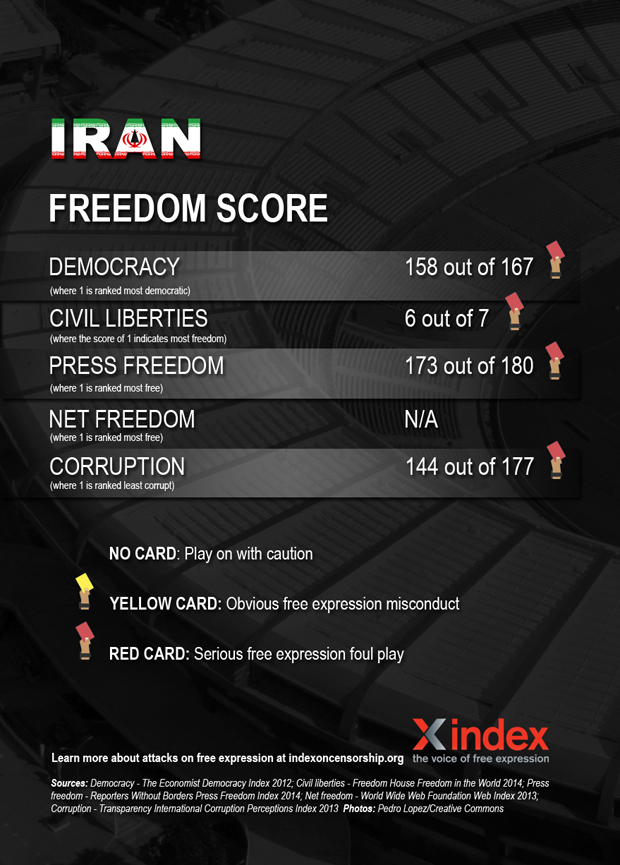
Team Melli will hope that their fourth appearance at the World Cup will see them progress from the group stages for the first time. When he was elected almost a year ago, there was hope that President Hassan Rouhani would be a progressive force within Iran. The results so far have been mixed.
Since coming into power, Rouhani has taken some steps to improve press freedom, such as withdrawing 50 motions against journalists, and lifting some restrictions on previously banned topics. However, the government still controls all TV and radio, and censorship and self-censorship is widespread. The latest figures put the number of jailed journalists in Iran at 35. In January 2013, a group of journalists were arrested for allegedly cooperating with “anti revolutionary” news outlets abroad. Journalists’ associations and civil society organisations that support freedom of expression have also been targeted.
The internet and social media played a significant part in publicising and documenting the protests that followed the 2009 election, which many Iranians believed was fraudulent. The regime has banned Facebook, YouTube, Twitter and, recently, Instagram. The lead-up to the 2013 elections saw Iranian leaders tightening access to the web, and silencing “negative” news. While Rouhani — seemingly an avid Twitter user — has indicated plans to relax web censorship, the country’s plans to launch a “national internet” are said to be going ahead.
In May, eight people were jailed on charges including blasphemy, propaganda against the ruling system, spreading lies insulting the country’s supreme leader Ayatollah Ali Khamenei on Facebook. Recently, a group of young people were arrested over a video posted of them singing and dancing along to the song “Happy”, which police called was a “vulgar clip” that had “hurt public chastity”. Some commentators believe the move was meant to intimidate Iranians and discourage online criticism.
Nigeria
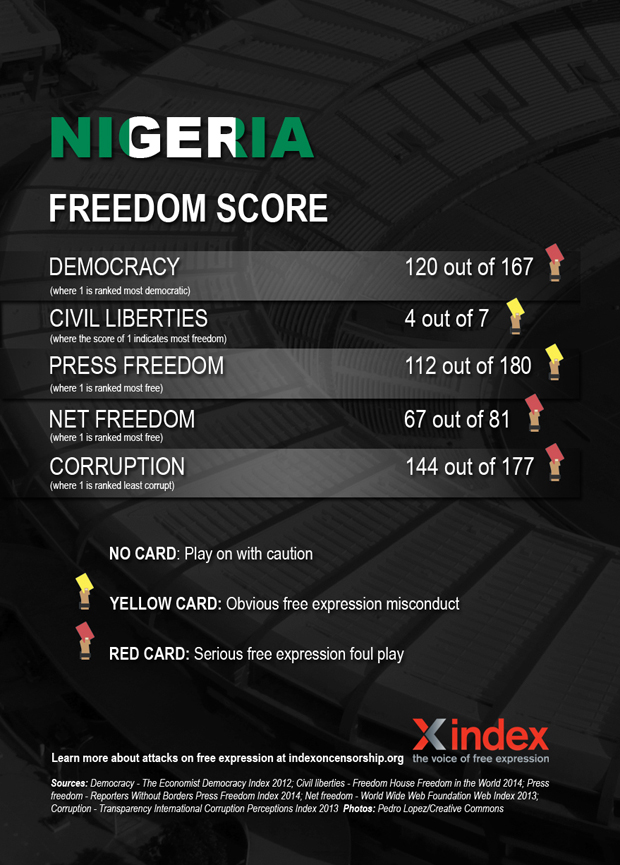
Brazil 2014 marks 20 years since Nigeria’s first outing at the World Cup, and the Super Eagles arrive at the tournament as reigning Africa Cup of Nations champions. The country’s leadership, however, is not a champion of free expression.
While parts of Nigerian media is controlled by people directly involved in politics, the country can also boast a lively independent media sector. However, journalists, especially those covering sensitive topics such as corruption or separatist and communal violence still face threats. Journalists have been arrested by security forces, and media outlets have been attacked by terrorists. Legal provisions such as sedition and criminal defamation also challenge press freedom. In 2011, a journalist was arrested over stories detailing alleged corruption in the Nigerian Football Federation.
The country’s freedom of information act was put in place in 2011. However, when human rights lawyer Rommy Mom tried to use the legislation to trace some 500 million of missing aid money allocated to his flood ravaged home state of Benue, he was met with threats from people connected to the state governor, and was forced to flee.
The Same Sex Marriage Prohibition Act 2013 outlawing gay marriage and relationships, was signed into law by President Goodluck Jonathan in January. The unpublished law makes it illegal for gay people to hold meetings, and outlaws the registration of homosexual clubs, organisations and associations. Those found to be participating in such acts face up to 14 years in jail.
Nigeria has come under international attention in recent months for abduction of the Chibok school girls by terrorist group Boko Haram. Among other things, Nigerians responded with the powerful #BringBackOurGirls campaign. In June however, authorities seemed to ban an offline protest against the kidnappings, before quickly backtracking. It is also worth noting that the Nigerian government has targeted journalists in their “war on terror”.
Russia
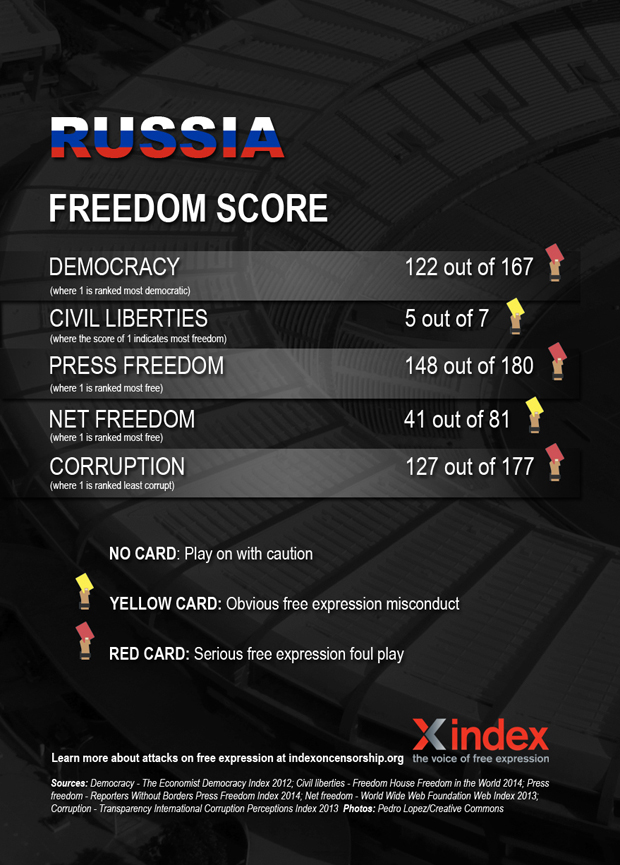
Team Sbornaya travel to Brazil in the knowledge that next time in the World Cup rolls around, they will be playing on home soil. Russia of course, recently hosted another international sporting event — the 2014 Winter Olympics. However, global attention did not improve the country’s poor record on freedom of expression. In fact, experts predicted a rise in censorship ahead of the Olympics.
Press freedom has long been under attack by Russian authorities, with TV news currently providing little beyond the official government line. In the last few months, the relatively well-respected TV channel RIA Novosti was liquidated following a decree by President Vladimir Putin, and replaced by a new press agency headed by a Kremlin-loyalist. In January, Dozhd, a popular independent TV channel was dropped by satellite and cable operators over a controversial survey. For the remaining critical journalists, Russia — one of the countries with the highest number of unpunished journalist murders — is a dangerous place to work.
The crackdown on the internet is widely believed to have started with the protests surrounding the elections securing Putin’s third term in power, organised partly through social media, but it has recently intensified. The Duma has adopted controversial amendments to an information law, targeting bloggers with blocking and fines for anything from failing to verify information posted, to using curse words. Also recently, the founder of “Russian Facebook” VKontakte says he was forced out, with the son of the head of Russia’s largest state-run media corporation predicted to take over as CEO. In 2013, the Duma approved legislation allowing immediate blocking of websites featuring content deemed “extremist”.
Public protests are discouraged through forceful responses by police, arrests, harsh fines and prison sentences. The country’s recent anti-gay legislation also pose a big threat to free expression and assembly. The ban on “promotion” of gay relationships, means that any form of expression deemed to be “gay propaganda” can be shut down. The law has also lead to physical attacks on Russia’s LGBT population.
An earlier version of this article stated that Brazil 2014 marks ten years since Nigeria’s first outing at the World Cup. This has been corrected.
This article was published on June 12, 2014 at indexoncensorship.org


